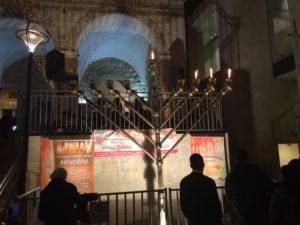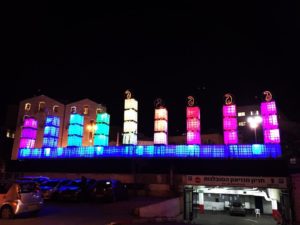Sufganiyot Everywhere
I adore the homemade sufganiyot that I have enjoyed in the homes of my Minnesota friends, but nothing prepared me for the spectacle of these tasty and almost outrageous Hanukkah treats in Israel. In doing my research for this piece (yes, this is a tough gig), I visited Rolidin and saw throngs of people from all over the world inspecting a huge range of flavored donuts…well, in America we think of them as donuts but this doesn’t begin to do them justice. I came home with a treat covered with cherry glaze, pistachio cream and a cherry on top, and the center was filled with more pistachio cream. It was simply amazing. There is a serious devotion to the art of the sufganiyah that is unique to Hanukkah in Israel.
Hanukkah is for Everyone
Despite Hanukkah’s Jewish context, it is a holiday that seems to be enjoyed by everyone; secular or religious, Jewish or not. And unlike in the U.S., Hanukkah in Israel is a very public holiday. Boaz Dorot, a Jerusalem musician, composer and arranger, says the he feels the holiday everywhere he goes. “Hanukkah is celebrated all around you. When you walk in a neighborhood, you can hear families simultaneously gathering and singing, each in their home.” But this doesn’t happen just at home. “Every office and company celebrates Hanukkah. Companies do big candle-lighting gatherings, which unite everyone. Suddenly, the big boss lights a candle and everyone hears him singing the blessing. It’s like an informal excuse to gather together, to meet, and to eat!”
Almost every evening event that takes place during Hanukkah will begin with lighting candles, making blessings, and singing Maoz Tzur, even if it’s in a completely secular context. This includes classical music and rock concerts, large soccer games, malls, hospitals, banks. In short, almost every sphere of public life.
It is the public nature of Hanukkah in Israel that makes the season special. Boaz notes that, unlike many other Jewish holidays, this is a secular chag. “The country keeps on going, everyone works, nothing is shut down (except for school), so it gives everyone an opportunity to celebrate a Jewish festival, in a secular manner, and mixing Orthodox and secular people in public spaces.”
Boaz continues, “Even in an Arab restaurant in Jaffa, you can find yourself eating at in a room filled with foreign people, and then everyone stands up, the waiter brings in a hanukiah, and magic happens…you find yourself singing Maoz Tzur in an embarrassing, yet happy, bizarre setting.”
A Festival of Light in a Heavy Place
As many have said about Israel, we are living in a tough neighborhood. Israelis refer to the constant social-political-military tension as ha matzav, the situation. And with the eruption of a series of lone-wolf attacks on city streets and in towns and settlements across the country, it has been a rough autumn. While Israelis are generally very good at enjoying life, it appears to me that there has been a weight on the collective shoulders of the population.
The lights of Hanukkah have set loose a lightness of being onto the streets of Jerusalem. It is palpable as families walk together in search of sufganiyot, as co-workers gather to light candles, and as the guy who does my laundry sticks his head out of his shop to wish me “Hanukkah sameach,” when I pass by. There’s dancing in the streets, and a nightly light and music show projected on the walls of the Old City.
In Israel, Hanukkah is infectious. The dark winter sky is aglow with holiday lights, the cold night air is warmed, and our hearts are cracked open by the shared joy of family, friends and strangers.
Chag urim sameach M’Yerushalayim!
This is the sixth in a series of posts about life in Jerusalem through the eyes, ears and experiences of a first-year rabbinical student. Previous posts can be found here.



